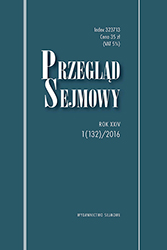Wstępne koncepcje unormowania zasady powszechności prawa wyborczego do Sejmu na ziemiach Królestwa Polskiego po wybuchu I wojny światowej (styczeń–lipiec 1917 r.)
Initial Approaches to Regulate the Principle of Universal Suffrage in Elections to the Sejm in the Lands of the Kingdom of Poland after the Outbreak of World War I (January–July 1917)
Author(s): Kamil KacperskiSubject(s): History of Law, Constitutional Law
Published by: Kancelaria Sejmu
Keywords: election; electoral law; electoral qualifi cations; bill; constitution; Parliamentary-Constitutional Commission of the Provisional Council of State
Summary/Abstract: The legislative work carried out by the Parliamentary Constitutional Commission of the ProvisionalCouncil of State from February to July 1917 was an important step in the process of establishingthe system of government in the lands of the Kingdom of Poland after the outbreak of the WorldWar I. Under the draft constitution of 28 July 1917, whose adoption crowned the first phase of statecreationefforts undertaken by the Parliamentary-Constitutional Commission, Parliament (Sejm) inthe reborn Poland had to be composed of two chambers: the House of Deputies (Izba Poselska) andthe Senate. Elections to the fi rst chamber, according to the sponsors of the draft, were to be carriedout on the basis of four main standards of electoral law: equality, directness, proportionality and secrecyof the ballot. Nevertheless, they decided not to enshrine the principle of universal suffrage inthe Constitution. They concluded that active and passive voting rights — in accordance with thepractice of nineteenth-century constitutionalism, which emphasized the negative impact of women’sinvolvement in political activities — should be given only to men. Even more restrictive solutionswas introduced in relation to the Senate. Half of its members (to be chosen by way of election)were subject to several electoral qualifi cations, relating not only the realm of sex, but alsoissues of wealth or education. In analyzing this issue, we must take into account that the application of the above-mentioned decisions,even if not satisfactory to the progressive society, contributed to initiation — for the fi rst timein the twentieth century in the lands of the Kingdom of Poland — an in-depth discussion on thedesignation of the category of persons entitled to participate in parliamentary elections. In thelonger term, their preparation, supported by global democratic changes, accelerated the efforts toequalize the legal status of citizens in the Second Republic of Poland.
Journal: Przegląd Sejmowy
- Issue Year: 2016
- Issue No: 1
- Page Range: 85-106
- Page Count: 22
- Language: Polish

